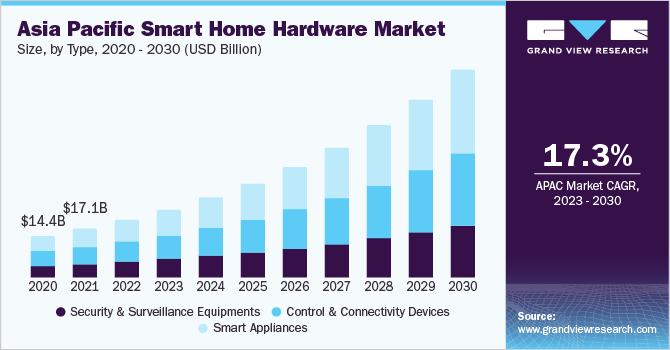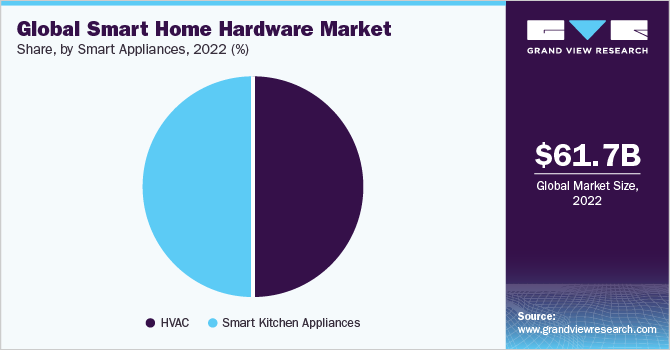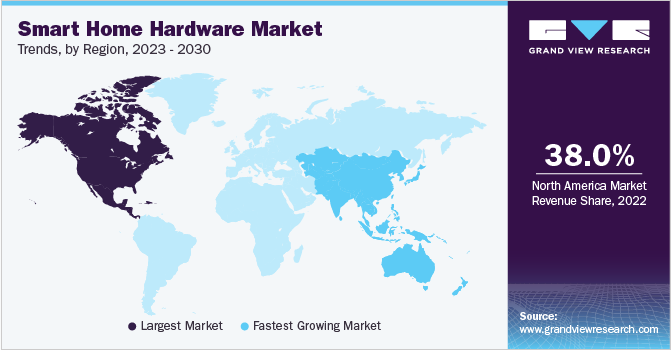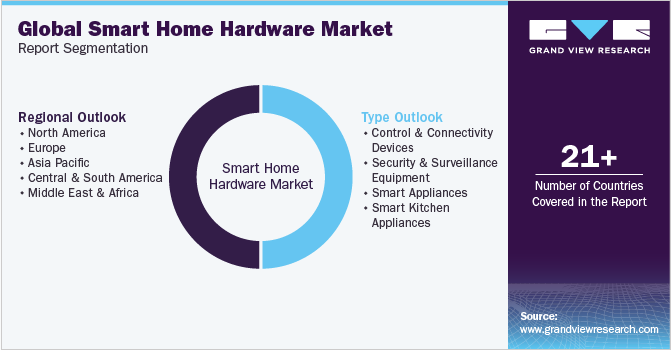
Smart Home Hardware Market Size, Share & Trends Analysis Report By Type (Control & Connectivity Devices, Smart Appliances (HVAC, Smart Kitchen Appliances)), By Region, And Segment Forecasts, 2023 - 2030
- Report ID: GVR-4-68039-928-0
- Number of Report Pages: 102
- Format: PDF
- Historical Range: 2017 - 2021
- Forecast Period: 2023 - 2030
- Industry: Semiconductors & Electronics
Smart Home Hardware Market Size & Trends
The global smart home hardware market size was valued at USD 61.73 billion in 2022 and is expected to grow at a compound annual growth rate (CAGR) of 14.3% from 2023 to 2030. The increasing availability of affordable smart home devices and the growing number of compatible devices are significant drivers of the smart home hardware industry. In the past, smart home devices were expensive and often required professional installation, which made them inaccessible to most homeowners. However, with advancements in technology and the introduction of new players in the market, the prices of smart home devices have significantly decreased, making them more affordable for the average homeowner.

Moreover, the growing number of compatible devices in the market has made it easier for homeowners to customize their smart home systems according to their needs and preferences. For example, homeowners can now choose from various smart home devices compatible with popular voice assistants like Amazon Alexa or Google Assistant, allowing them to control their devices through voice commands. The quick acceptance of modern technologies, such as the blockchain, Internet of Things (IoT), smart voice recognition, artificial intelligence (AI), and others, significantly impacted market growth. The technology equips smart home products to recognize the voice of users and give them personalized responses. An improved adoption rate of IoT in developing and developed regions has helped grow the smart home hardware industry. The capability of technologies to allow interconnectivity between devices has helped generate further market demand.
The Asia Pacific region has seen significant growth in the smart home hardware market in recent years. The region is growing due to countries such as China, India, and Japan, which drive demand for smart home products. The increasing popularity of smart home devices can be attributed to several factors, including rising disposable income, growing urbanization, and increasing awareness about the benefits of smart home technology. In addition, the proliferation of smartphones and other mobile devices has made it easier for consumers to control and monitor their homes remotely. Further, China is expected to grow at the highest CAGR during the forecast period, owing to the increasing adoption of home automation systems and the growing popularity of voice-activated assistants such as Alibaba.com; T-mall Genie, and Baidu's DuerOS.
Increased deployment of internet and digital gadgets post the COVID-19 outbreak, has led to significant growth in the demand for smart home devices. The increased disposable incomes among individuals due to decreased day-to-day expenses have led to rapid demand for home security solutions, including smart locks and cameras, to facilitate contactless deliveries during COVID-19. With people becoming more conscious about health during this period, increased demand for smart home healthcare solutions, like remote chronic health monitoring systems, has been witnessed. Also, with the changing lifestyle of individuals due to the work-from-home norms, there is a growing demand for smart speakers or hubs to track tasks & meetings and maximize productivity.
Type Insights
The smart appliances segment projected the highest revenue share of over 36% in 2022 and the segment is anticipated to hold the maximum share throughout the forecast period. The growth is due to increased household spending and the implementation of smart products in homes. As a result, the efficiency, operational costs, and time-saving benefits remain visible. Smart appliances such as refrigerators and dishwashers are equipped with features such as Wi-Fi and mobile connectivity, artificial intelligence integration, touchscreen controls, attached cameras inside to scan food types for refrigeration purposes, and more are enticing new customers to the market. A substantial mobile penetration rate and connectivity options such as mobile data or Wi-Fi contribute to the segment's demand.

The control & connectivity devices segment is predicted to foresee significant growth in the forecast years. These devices for smart homes have been rapidly evolving over the years. The strong growth is attributed to the features and capabilities offered, such as mobile connectivity, connectivity regardless of location, and more through protocols like ZigBee, Bluetooth, Wi-Fi, Z Wave, etc. Manufacturers prefer protocols that offer smooth communication and no harm to battery life and range. For instance, ZigBee operates on low latency and low-duty cycles for instant device communication, resulting in longer battery life.
Regional Insights
North America dominated the market in 2022, accounting for over 38% share of the global revenue. The growth is attributed to the growing adoption of smart home devices to reduce energy charges and maximize energy efficiency. The region is one of the largest markets for smart home devices, and it is expected to continue to grow in the coming years. Increasing awareness and interest in smart home technology, the growing popularity of voice-activated assistants like Amazon Alexa and Google Assistant, and the increasing availability of smart home devices that are easy to install and use have made it easier for people to control their smart home devices using voice commands.

Asia Pacific is anticipated to register the highest CAGR from 2023 to 2030. It is due to the improved standard of living and increased disposable income among individuals in the region. Rapid penetration of smartphones, the internet, and other digitally advanced equipment is expected to drive the market in the region. Furthermore, the increased demand for AI-based digital assistance, such as Siri and Alexa, significantly impacts market growth. The growing need for energy-saving and low-carbon-emission-oriented solutions propels the market in Asia Pacific.
Key Companies & Market Share Insights
Many prominent companies launch new products to increase market share, but developing existing products is the most common strategy. This approach is often accompanied by initiatives such as expanding into new markets, merging with or acquiring other companies, entering into contracts or agreements, and forming partnerships and collaborations with other entities. For instance, in January 2022, Samsung Electronics Co., Ltd. increased its footprint in the U.S. by partnering with Logical Buildings, Constellation, and Oracle Utilities to fulfill the rising need for smart energy solutions.
The company makes it more accessible and easier for users to make wiser decisions about their energy consumption and reduce environmental effects by collaborating with energy suppliers, energy management platforms, and sustainability partners. These companies may also introduce pricing strategies to stay ahead of the competition. For instance, in April 2023, Amazon reduced the price of their Fire TV sticks, with specific models selling for as little as GBP 15. Amazon and other retailers, including Argos, Currys, and John Lewis, trade the device, which is described as fast and efficient. Some prominent players in the global smart home hardware market include:
-
Google LLC
-
Amazon.Com Inc.
-
Honeywell Corporation Inc.
-
Schneider Electric SE
-
Johnson Control Inc.
-
ABB Ltd.
-
Legrand
-
Panasonic Corporation
-
Samsung Electronics Co. Ltd.
-
General Electric Company
Smart Home Hardware Market Report Scope
|
Report Attribute |
Details |
|
Market size value in 2023 |
USD 70.83 billion |
|
Revenue forecast in 2030 |
USD 180.85 billion |
|
Growth rate |
CAGR of 14.3% from 2023 to 2030 |
|
Base year for estimation |
2022 |
|
Historical data |
2017 - 2021 |
|
Forecast period |
2023 - 2030 |
|
Report updated |
May 2023 |
|
Quantitative units |
Revenue in USD million/billion, and CAGR from 2023 to 2030 |
|
Report coverage |
Revenue forecast, company ranking, competitive landscape, growth factors, trends |
|
Segments covered |
Type, region |
|
Regional scope |
North America; Europe; Asia Pacific; Central & South America; MEA |
|
Country scope |
U.S.; Canada; UK; Germany; France; China; Japan; India; Brazil; Argentina; Saudi Arabia; South Africa |
|
Key companies profiled |
Google LLC; Amazon.Com Inc.; Honeywell Corporation Inc.; Schneider Electric SE; Johnson Control Inc.; ABB Ltd.; Legrand; Panasonic Corporation; Samsung Electronics Co. Ltd.; General Electric Company |
|
Customization scope |
Free report customization (equivalent up to 8 analysts' working days) with purchase. Addition or alteration to country, regional & segment scope. |
|
Pricing and purchase options |
Avail customized purchase options to meet your exact research needs. Explore purchase options |
Global Smart Home Hardware Market Report Segmentation
This report forecasts revenue growth at global, regional, and country levels and provides an analysis of the latest industry trends in each of the sub-segments from 2017 to 2030. For this study, Grand View Research has segmented the global smart home hardware market report based on type, and region.

-
Type Outlook (Revenue, USD Million, 2017 - 2030)
-
Control & Connectivity Devices
-
Lighting Controls
-
Smart Lights
-
Relays & Switches
-
Occupancy Sensors
-
Dimmers
-
Other Products
-
-
Entertainment Devices
-
-
Security & Surveillance Equipment
-
Security Cameras
-
Video Door Phones
-
Smart Locks
-
Others
-
-
Smart Appliances
-
HVAC
-
Smart Thermostats
-
Sensors
-
Smart Vents
-
Others
-
-
Smart Kitchen Appliances
-
Smart Refrigerators
-
Smart Dishwasher
-
Smart Cookware & Cooktop
-
Smart Oven
-
-
-
-
Regional Outlook (Revenue, USD Million,2017 - 2030)
-
North America
-
U.S.
-
Canada
-
-
Europe
-
U.K.
-
Germany
-
France
-
-
Asia Pacific
-
China
-
Japan
-
India
-
-
Central & South America
-
Brazil
-
Argentina
-
-
Middle East and Africa (MEA)
-
Saudi Arabia
-
South Africa
-
-
Frequently Asked Questions About This Report
b. The global smart home hardware market was estimated at USD 61.73 billion in 2022 and is expected to reach USD 70.83 billion in 2023.
b. The global smart home hardware market is expected to grow at a compound annual growth rate of 14.3% from 2023 to 2030 to reach USD 180.85 billion by 2030.
b. Asia Pacific dominated the smart home hardware market with a share of 32.8% in 2022. This is attributable to improvements in advanced technology and economic growth, increasing urbanization, and the big telecom industry in the Asia Pacific.
b. Some key players operating in the smart home hardware market include Google LLC; Amazon.Com Inc.; Honeywell Corporation Inc.; Schneider Electric SE; Johnson Control Inc.; ABB Ltd.; Legrand; Panasonic Corporation; Samsung Electronics Co. Ltd.; and General Electric Company.
b. Key factors driving the smart home hardware market growth include the growing adoption of smart home devices, the rising importance of home monitoring systems, the rising development of broadband, and the increased usage of smartphones to control smart devices remotely across the globe.
We are committed towards customer satisfaction, and quality service.
"The quality of research they have done for us has been excellent."




